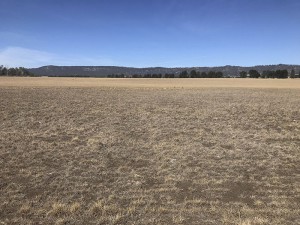Small Mercy in Dire Drought
THE cattle sales are a good indicator of the state of the land and this week there were 3,300 penned, almost three times the usual number.
The Upper Hunter is a small pocket gripped in drought while other areas in the state have feed.
Stuart Sheldrake from MacCallum Inglis said the drought is becoming dire but the fact that other areas are doing well is a small blessing for local cattle producers.
“In dry times gone by when it has been dry everywhere that’s when the market falls in a heap because there is just nowhere to go with cattle, but at least we have avenues to go to this time and the market is actually holding,” said Mr Sheldrake.
“It is a bit cheaper just on the sheer numbers coming out of our area, but it’s still very very good,” he said.
“There are a lot of people in trouble and most people are feeding their stock in some way.
“People have different avenues about what they might do, some people are sending their cattle away on agistment if that is possible, that’s been hard and difficult,” he said.
“Then some people are feeding fodder or hay or pellets to keep their calves going, or they might take the calves off the cow and try and keep their breeder cows going with fodder,” Stuart Sheldrake said.
While some farmers may be able to hang onto their cattle and feed them, which is costly with freight, the lack of water for stock is becoming a deal breaker for many.
“There are a lot of people who are having to sell everything because they are out of water, water is a big issue,” said Mr Sheldrake.
“You can feed cattle, but you can’t water cattle, because a grown animal can drink 50 litres a day and if you have a 100 head that’s a lot of water.
“Once you run out of water there is no other option that to sell or move the cattle elsewhere,” he said.
“The other worrying thing is if we go dry for another couple of months the land is that dry that the recovery of the land could take a while, then we have winter on our doorstep, so it will be an issue if we don’t get rain here in the next six to eight weeks,” he said.
“You might get rain at the end of February or March but by the time your land recovers it is April or May and then you could get the first frost and it’s a long road through winter, so it is starting to get worrying,” Stuart Sheldrake said.
Related story:
- Sell and Weep, but Sell Anyway – January 22, 2018.
- Drought Support at Bunnan – January 23, 2018.
 scone.com.au
scone.com.au